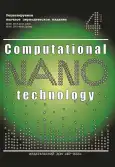Analysis of the implementation of the agent-based approach and features of the simulation of a seaport in the AnyLogic environment
- Authors: Shevchenko A.M.1, Dyda A.A.1
-
Affiliations:
- Admiral G.I. Nevelsky Maritime State University
- Issue: Vol 11, No 4 (2024)
- Pages: 135-145
- Section: COMPUTER MODELING AND DESIGN AUTOMATION SYSTEMS
- URL: https://journal-vniispk.ru/2313-223X/article/view/282570
- DOI: https://doi.org/10.33693/2313-223X-2024-11-4-135-145
- EDN: https://elibrary.ru/HBVHKX
- ID: 282570
Cite item
Abstract
The relevance of this article is due to the interest in simulation modeling in the context of doing business, as well as in order to improve it. Modeling gives you an in-depth understanding of how a business works, allowing you to experiment with it in a secure digital environment and identify bottlenecks that require optimization. At the same time, one of the most important steps in building a model is to adjust the source data. If you do not take into account the operations typical for the company, the result of the experiments will not be plausible in the model and, therefore, inapplicable in practice. It is also important to define an approach to simulation modeling, since the result of modeling after an incorrect choice can take a long time and turn out to be unprofitable. A modern workforce that supports any logic is pre-configured to create simulation models that regulate the real tactics and operation of seaport container terminals: ship sections, cargo transportation, transportation by various modes of transport and personnel composition. As part of the study, the reconstruction of the antenna path was considered, and a description of its special reconstruction in the Anylogic center was considered using the example of the container terminal of the Vladivostok commercial port.
Full Text
##article.viewOnOriginalSite##About the authors
Anastasia M. Shevchenko
Admiral G.I. Nevelsky Maritime State University
Author for correspondence.
Email: anastasiya2100@bk.ru
SPIN-code: 6698-2474
postgraduate student
Russian Federation, VladivostokAlexander A. Dyda
Admiral G.I. Nevelsky Maritime State University
Email: adyda@mail.ru
SPIN-code: 1187-5058
Dr. Sci. (Eng.); Professor, Department of Automatic and Information Systems (AIS), Faculty of Electronics and Information Technologies
Russian Federation, VladivostokReferences
- Akopov A.S. Simulation modeling: Textbook and workshop for academic bachelor’s degree. Lyubertsy: Yurait, 2016. 389 p.
- Bocharov E.P., Aleksentseva O.N. Simulation of economic processes. Textbook. Saratov: Saratov Socio-Economic Institute (branch) of the Plekhanov Russian University of Economics. Saratov, 2014. 160 p.
- Bulygina O.V., Yemelyanov A.A., Yemelyanova N.Z. Simulation modeling in economics and management. Textbook. M.: Infra-M, 2017. 447 p.
- Vyunenko L.F., Mikhailov M.V., Pervozvanskaya T.N. Simulation modeling: Textbook and workshop for academic undergraduate studies. Lyubertsy: Yurait, 2016. 283 p.
- Kobelev N.B., Polovnikov V.A., Devyatkov V.V. Simulation modeling. Textbook. Moscow: KURS, 2013. 368 p.
- Karpov Yu. Simulation modeling of systems. Introduction to modeling with AnyLogic. St. Petersburg: BHV, 2009. 400 c.
- Kobelev N.B., Polovnikov V.A., Devyatkov V.V. Simulation modeling. Textbook. Moscow: Infra-M, 2016. 448 p.
- Korablev Yu.A. Simulation modeling (for bachelors). Moscow: KnoRus, 2018. 59 p.
- Lychkina N.N. Simulation modeling of economic processes. Textbook. Moscow: Infra-M, 2012. 254 p.
- Muravyov D.S. The use of simulation modeling to assess the processing capacity of seaports and substantiate the need for the construction of a “dry” port. Modern Problems of the Russian Transport Complex. 2013. No. 4. Pp. 66–72. (In Rus.)
- Prokofieva T.A. Logistic infrastructure of international transport corridors: A cluster approach to management. The World of Transport. 2015. Vol. 9. No. 1. Pp. 50–57. (In Rus.)
- Rybin P.K., Yershikov N.V., Komovkina N.S., Putilina D.V. Analysis of the structure of train and wagon flows arriving at the Russian ports of the Gulf of Finland. Proceedings of Petersburg Transport University. 2018. No. 3. Pp. 478–486.
Supplementary files













